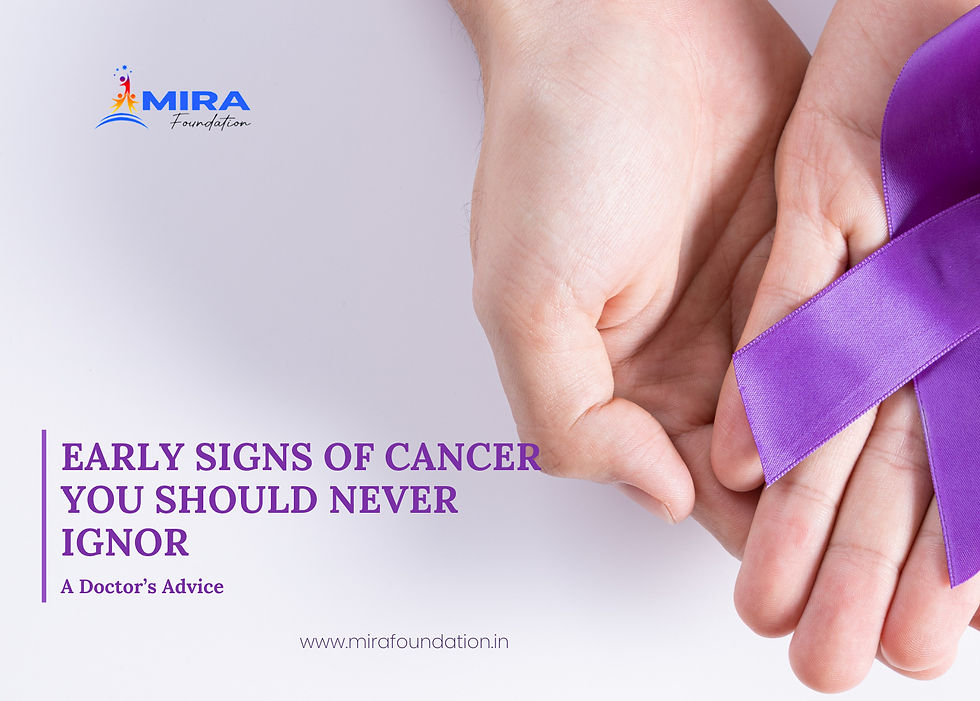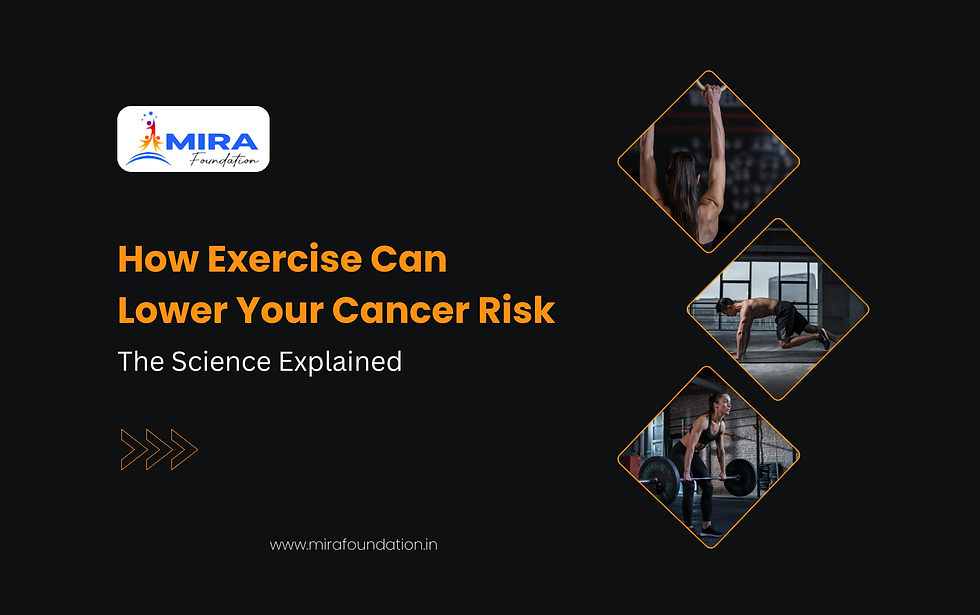Early Signs of Cancer You Should Never Ignore – A Doctor’s Advice
- miraimpacts
- Feb 5, 2025
- 3 min read
Updated: Feb 6, 2025

Cancer is a silent disease that often develops unnoticed in its early stages. Many people dismiss warning signs as minor health issues, only to discover the condition when it has progressed. Early detection is crucial for successful treatment, and recognizing potential symptoms can make all the difference.
In this article, we’ll explore 10 early warning signs of cancer that you should never ignore, based on medical expert advice. If you or someone you know is experiencing these symptoms, consulting a doctor for further evaluation is highly recommended.
1. Unexplained Weight Loss
Why It’s a Concern:
Losing weight without changes in diet or exercise can be an early sign of cancers like stomach, pancreatic, or lung cancer. Rapid weight loss may indicate that cancer is affecting metabolism or causing systemic changes in the body.
When to See a Doctor:
If you lose more than 10 pounds without trying.
If the weight loss is sudden and unexplained.
2. Persistent Fatigue That Won’t Go Away
Why It’s a Concern:
Fatigue is common, but extreme tiredness that doesn’t improve with rest could be a red flag for cancers like leukemia, colon, or stomach cancer.
When to See a Doctor:
If fatigue is persistent, unexplained, and extreme.
If it’s accompanied by dizziness, shortness of breath, or weakness.
3. Lumps or Swellings That Don’t Go Away
Why It’s a Concern:
A lump in the breast, neck, armpit, or other areas of the body could indicate cancer. While not all lumps are cancerous, painless, hard, and growing lumps should be checked.
When to See a Doctor:
If a lump persists for more than 2 weeks.
If it grows larger or changes in texture.
4. Persistent Cough or Hoarseness
Why It’s a Concern:
A lingering cough that lasts more than 3 weeks, especially when not linked to a cold or allergies, may signal lung, throat, or thyroid cancer.
When to See a Doctor:
If a cough doesn’t improve with medication.
If it is accompanied by blood, chest pain, or difficulty breathing.
5. Changes in Bowel or Bladder Habits
Why It’s a Concern:
Changes in bowel movements, such as persistent diarrhea, constipation, or blood in stool, could be signs of colon or rectal cancer. Urinary issues could indicate bladder or prostate cancer.
When to See a Doctor:
If changes in bowel or bladder habits last more than 2 weeks.
If you notice blood in your stool or urine.
6. Unexplained Pain That Doesn’t Go Away
Why It’s a Concern:
Chronic pain that isn’t linked to an injury and doesn’t go away with medication may be a warning sign of bone, ovarian, or pancreatic cancer.
When to See a Doctor:
If pain lasts more than a month without improvement.
If pain worsens at night or with rest.
7. Skin Changes (Moles, Dark Spots, or Wounds That Don’t Heal)
Why It’s a Concern:
Skin changes, including new moles, unusual discoloration, sores that don’t heal, or sudden growths, can be early signs of skin cancer (melanoma).
When to See a Doctor:
If a mole changes in size, shape, or color.
If a wound doesn’t heal after 2-3 weeks.
8. Difficulty Swallowing or Persistent Indigestion
Why It’s a Concern:
Trouble swallowing or frequent indigestion could be an early symptom of esophageal, stomach, or throat cancer.
When to See a Doctor:
If swallowing pain persists for more than 2 weeks.
If there’s a feeling of food getting stuck or frequent heartburn.
9. Unusual Bleeding or Discharge
Why It’s a Concern:
Unexplained bleeding, such as blood in the stool, urine, or coughing up blood, may signal serious conditions like colon, lung, or cervical cancer.
When to See a Doctor:
If there’s vaginal bleeding outside of normal periods.
If there’s blood in the stool, urine, or from the nose.
10. Sores in the Mouth That Don’t Heal
Why It’s a Concern:
Mouth ulcers that last for weeks, especially if accompanied by white or red patches, could be an early sign of oral cancer.
When to See a Doctor:
If the sore persists for more than 2 weeks.
If there is pain, bleeding, or difficulty chewing.
Final Thoughts: Don’t Ignore the Warning Signs
Recognizing early signs of cancer can save lives. While many of these symptoms could have non-cancerous causes, it’s always best to get checked by a doctor. Early detection greatly improves the chances of successful treatment.
When to Take Action:
🚨 If a symptom persists for more than 2 weeks, consult a healthcare professional.
🩺 Regular check-ups and screenings are key to catching cancer early.
If you found this article helpful, share it with your loved ones to spread awareness!




Comments